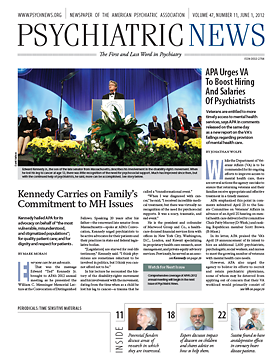Single genes may explain just a fraction of the risk of developing anxiety disorders, but genetics is useful when allied with other approaches, said Jordan Smoller, M.D., Sc.D., at the 7th Annual Conference on Amygdala, Stress, and Posttraumatic Stress Disorder, held at the Uniformed Services University of the Health Sciences in Bethesda, Md., in April.
Family studies are the first step in testing for heritability, said Smoller, an associate professor of psychiatry at Harvard Medical School and an associate professor of epidemiology at the Harvard School of Public Health. A look at first-degree relatives of affected individuals with panic, phobic, generalized anxiety, or obsessive-compulsive disorder finds a population-attributable risk of between 20 percent and 40 percent, compared with a rate of 80 percent for bipolar disorder or schizophrenia.
Smoller’s work focuses on genes with a clear association between genotype and anxiety. The phenotype can be observed in temperament and brain structure.
Variations in temperament—the normal variation in behavioral affectivity—and in the structure and function of the amygdala and prefrontal cortex are associated with risk for anxiety disorders, he said. Smoller has studied a cohort of children who were first observed at 14 months. At that time, about 15 percent exhibited behavioral inhibition—an avoidant response to novel environments.
“They were quiet, inhibited, and shy,” said Smoller. “These characteristics were visible well before they had experienced a lot of environmental effects.”
The same children (n=158) underwent neuroimaging in late adolescence. The researchers then found a pattern of increased amygdala activation and decreased cortical thickness in these adolescents. Genotyping revealed a correlation with the RGS2 gene, previously found to be associated with anxiety in mice. Certain single-nucleotide polymorphisms in this gene were associated with shy, inhibited temperament in the children.
Smoller’s group has also studied a group of 1,050 young adults aged 18 to 35, none of whom had a psychiatric diagnosis. Structural imaging showed that left amygdala volume correlated with a composite negative affectivity score. The correlation was strongest in those with the highest score and was inversely correlated with rostral anterior cingulate cortex thickness.
Doing genetic studies in anxiety disorders is not easy, Smoller noted. It is difficult to find uncommon genes, and it appears that most complex disorders are likely caused by many rare genes, each with small effects. In addition, research is hampered by uncertain phenotype definition boundaries that have shifted over time and become more complex, as any reader of DSM knows, he said. Candidate-gene studies have inherent limitations because they involve making an educated guess ahead of time about which gene to look for. Most studies have been small, underpowered, and not longitudinal, he pointed out.
Smoller’s next step will be joining with the worldwide Psychiatric Genome-wide Association Study Consortium to combine genomewide association studies with genotyping and with imaging to look for both rare and common gene variants and phenotypic associations.

